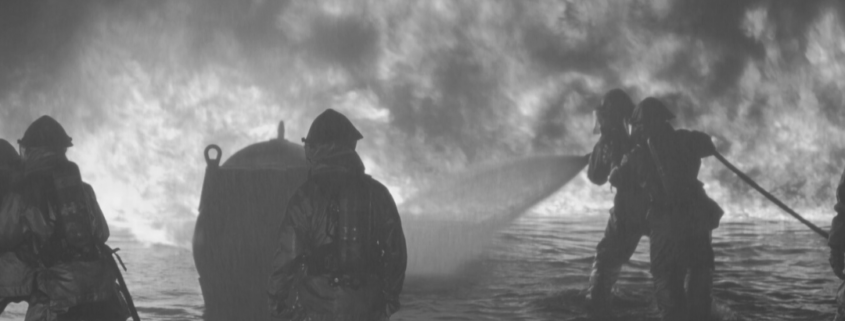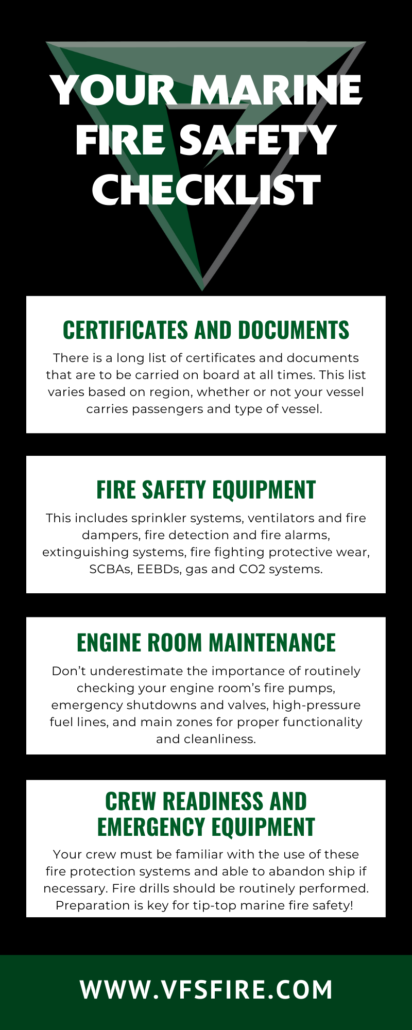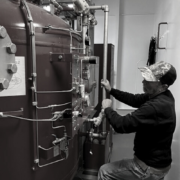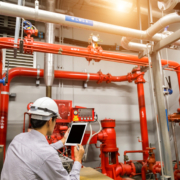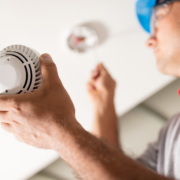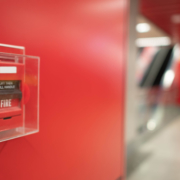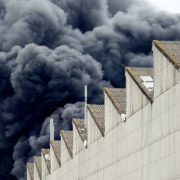YOUR MARINE FIRE SAFETY CHECKLIST
You wouldn’t think fire could stand a chance when surrounded by a body of water—but it does. Boom! It feels like in every action movie ever created, a boat explodes in a bay or on the ocean. Although dramatized, there’s a reality to it. Directors paint the danger picture perfectly!
At VFS Fire & Security Services, we are the drivers of innovation within the fire protection industry, including specialization in marine fire safety. Although most fires seem to look the same in movies, there are a variety of different types of fires that may occur on your vessel. We’re in the business of educating people and keeping them safe when it comes to fire protection, which is why a marine fire safety checklist is necessary for any marine-related organization.
YOUR MARINE FIRE SAFETY CHECKLIST
There is a multitude of boxes to check when it comes to keeping your maritime operations safe and fire-free. We’re providing a comprehensive list to get you thinking about the safety of your marine operations.
CERTIFICATES AND DOCUMENTS
There is a long list of certificates and documents that must be carried on board at all times. This list varies based on region, whether or not your vessel carries passengers, and vessel type.
This list might include a Cargo Ship Safety Equipment or Passenger Ship Safety Certificate, all servicing records including proof of fire extinguisher servicing and pressure tests, a damage control manual, any records of testing, drills, and maintenance, a variety of training manuals, the list goes on! For more specific information on staying up to code and what you need to keep on board, contact our VFS team!
FIRE SAFETY EQUIPMENT
There are hundreds of safety measures in place to prevent fire aboard your vessel, including a handful of safety equipment that must be carried and tests that must be performed. Let’s shoot for smooth sailing, please!
- Sprinkler systems: Valves, alarms, pumps, and pressure gauges must be tested and properly working with pipework in fair condition
- Ventilators and fire dampers: Must be clean and free of debris with flaps in fair condition
- Proper fire detection and fire alarm systems that provide the necessary coverage and protection of assets on board
- Properly installed extinguishing systems
- Personal equipment, including fire fighting protective wear, self-contained breathing apparatuses (SCBAs), and emergency escape breathing devices (EEBDs)
- Properly functioning gas and CO2 systems
Additionally, pathways must be always free of obstruction and clearly marked in the event of an emergency evacuation. Doors must always only be held open by approved methods.
ENGINE ROOM MAINTENANCE
Did you know that approximately 90% of marine fires start in the engine room? This considered, don’t underestimate the importance of routinely checking your engine room’s fire pumps, emergency shutdowns and valves, high-pressure fuel lines, and main zones for proper functionality and cleanliness.
DECK MAINTENANCE AND CREW READINESS
In case of an emergency, your crew should be familiar with the use of these fire protection systems and able to abandon ship if necessary. Fire drills should be performed routinely. Preparation is key for tip-top marine fire safety. As for deck safety, structures in place might include a variety of paint lockers, ventilators, and international shore connections.
EMERGENCY EQUIPMENT
Fingers crossed, this equipment doesn’t need to be used! Your emergency equipment, including emergency generators, batteries, pumps, and tankers, however, must be properly maintained, inspected, and ready to be used at any moment.
HERE TO HELP!
While you’re on the water, whether it be for pleasure or work, marine fire safety and preparation cannot be overlooked. Having the right fire safety equipment and performing the right maintenance and routine inspections may be the difference between life and death.
Our VFS team is prepared to get your vessel in tip-top shape with the right marine fire safety equipment. In fact, the VFS Houston Team has been continuing to grow our marine department and has recently acquired four new Tug & Barge Companies—bringing their annual total of vessels to perform fire safety inspections and testing to approximately 375.
With VFS by your side, you’ll be the fire protection talk of the town! Get in touch today to see what we can do for you.


